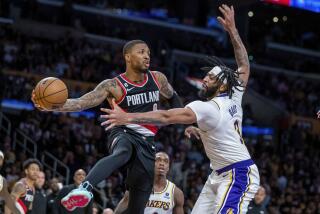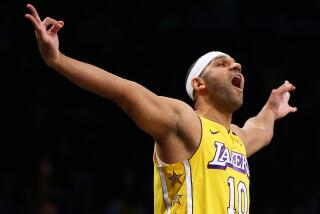Lockout Meant He Could Watch a Top Prospect
- Share via
Things Portland Trail Blazer Coach Mike Dunleavy did during the NBA lockout:
* Delivered Christmas trees to sick children.
* Painted the inside of a house in a low-income area.
* Watched his son play 10 high school basketball games.
* Ate too much.
* Wondered if his wife, Emily, was sick of him because he was always around.
* Wondered if the lockout ever was going to end.
* Wondered if a different strategy would have solved the labor dispute.
“Maybe they needed an earlier drop-dead date,” Dunleavy said.
As it turned out, the thing lasted 191 days, which oddly enough comes pretty darned close to matching the last two minutes of your typical NBA game.
But let’s not be critical here. This is a time of peace and love and healing and tons of money in the NBA, and Dunleavy should be way in touch with that since he has a $11.5-million contract through the 2001-2002 season (assuming that there is one).
Forget the money, though. Because he wasn’t coaching, Dunleavy traded his spot courtside for a seat in the bleachers, where he had too much fun watching his son, Michael, play basketball for Jesuit High in Portland.
Michael Dunleavy is a 6-foot-7 guard who was first-team All-State as a junior and recently signed a letter of intent to play at Duke.
Not South Carolina, like dad?
“They weren’t in the ballpark academically,” said Dunleavy, who listed his son’s other choices as Stanford and North Carolina.
“If I had been coaching instead of sitting in the stands, I might have seen only a couple of games,” Dunleavy said. “It’s just been terrific.”
He felt the same way about the charity work he was involved in during the lockout.
“There were just a lot of positive things going on in the community that the organization took part in,” he said. “It helped the organization too. What we did, they were all morale-builders. I was putting up insulation and painting. Now a low-income family can have a house and a lot of nice things they wouldn’t normally have. It’s a great way to start the year.”
So what we’ve got now in the NBA . . . great way to start the season, or what? Dunleavy said he’s just not sure, mainly because this is the first time an NBA labor dispute has ever gone down just like this.
“I just can’t believe it lasted as long as it did,” he said. “You would figure that intelligent people would figure you had to have a deal. This was just way too much time.”
He is management now, but Dunleavy once was a player representative, so he knows both sides. The only side he currently is worried about is what kind of shape his players are going to be when they show up at practice. Will they run or waddle? Dunleavy is concerned.
“I’ll find out soon enough. They probably think they’ve been working when they really haven’t,” he said. “It’s a fine line that hasn’t been walked before. I mean, what do you do? Do you work them hard to get them in shape and maybe risk injuries or do you take it easy and risk conditioning?
“It’s going to be pretty interesting.”
The Trail Blazers were one of the youngest NBA teams last season when they finished 46-36 and lost to the Lakers in the first round of the playoffs.
Their 1997-98 payroll was $28.46 million, 15th in the 29-team league. All their key players are under contract except point guard Damon Stoudamire, who made $1.7 million.
Dunleavy said he knows that Stoudamire, John Crotty, Brian Grant and Rasheed Wallace were working hard because he saw them in Portland--even if all he could do was say hello.
Any day now, Dunleavy can expand his greeting into something else because the lockout is just as gone as the old days when he made the league minimum $48,000 as a rookie with the Philadelphia 76ers in 1976-77.
More to Read
Go beyond the scoreboard
Get the latest on L.A.'s teams in the daily Sports Report newsletter.
You may occasionally receive promotional content from the Los Angeles Times.










